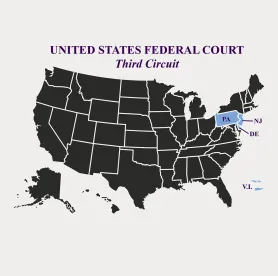Overview
The United States Court of Appeals for the Third Circuit ruled last week that whistleblower relators need not show “objective falsity” to prove their claims, and that a dispute among physician experts about a clinical judgment was sufficient to defeat the defendant’s summary judgment motion. United States v. Care Alternatives, No. 18-3298, 2020 WL 1038083 (3d. Cir. Mar. 4, 2020). This holding directly conflicts with the Eleventh Circuit’s September 2019 decision in United States v. AseraCare, which held that a mere difference of opinion between experts regarding a hospice patient’s prognosis was not enough to establish falsity under the FCA. As we discussed, AseraCare was largely considered a win for providers. See AseraCare 11th Circuit Case Holds Differences in Hospice Clinical Opinions Are Insufficient to Demonstrate Falsity Under the FCA; AseraCare FCA Ruling is a Boon for Health Providers. In Care Alternatives, however, the Third Circuit rejected AseraCare and found that conflicting expert testimony about the validity of physician hospice certifications was sufficient to raise a dispute of material fact about the “falsity” (separate from the “scienter” or knowledge requirement) necessary to prove an FCA violation. These conflicting rulings demonstrate both that where an FCA case is commenced may make a big difference for defendants, and that the question of FCA liability under the Medicare Hospice Benefit will be a hard-fought issue in other courts across the country.
The Facts and District Court Opinion
In Care Alternatives, former employees filed a qui tam action against a hospice provider, alleging the hospice had improperly admitted patients who were ineligible for Medicare’s Hospice Benefit and directed employees to falsify Medicare certifications to reflect eligibility. The parties’ experts disagreed as to whether a reasonable physician would determine that the patients in question were indeed hospice-eligible. Care Alternatives filed for summary judgment, arguing that a difference of opinion between the experts was insufficient to create a triable dispute of fact as to the element of falsity under the FCA. The lower court agreed, adopting and applying AseraCare’s holding that an “objective falsehood” – something more than a retrospective difference of opinion – was instead required.
The Third Circuit Reverses
On appeal, the Third Circuit disagreed and reversed. The Court first noted it is well-established that subjective opinions can be false, and applied this reasoning to the FCA’s falsity element. The Third Circuit also held that the AseraCare “objective falsity” standard applied by the lower court improperly conflated falsity and the FCA’s scienter requirement, i.e., that the whistleblower prove a certifying physician was making a knowingly false certification. The Court held that these elements must be considered separately, and that the purpose of the scienter requirement is to limit the possibility that a provider could be found to violate the FCA any time the Government or a relator could find an expert who may establish falsity by disagreeing with a physician’s prognosis.
The Third Circuit also held that the FCA’s falsity standard includes both “factual falsity” – when a claim is literally false on is face – and “legal falsity,” which considers whether the physician’s certification of eligibility complied with Medicare hospice regulations. The Court found that an expert opinion that differed from the certifying physician’s opinion was relevant evidence of whether the requirements of the regulations were satisfied and therefore whether there was evidence of legal falsity.
Key Takeaways
Because the Third Circuit explicitly disagreed with the Eleventh Circuit’s ruling in AseraCare, there is a budding circuit split and therefore a potential appeal to the United States Supreme Court to resolve these differing approaches. As of now, however, the key takeaway for hospice and other health care providers within the Third Circuit’s jurisdiction is that a physician’s reasonable opinion is not sufficient on its own to insulate providers from FCA liability. In addition, providers in other jurisdictions should note that while the AseraCare ruling was still a win for providers, it may not carry as much persuasive authority as it did prior to the Care Alternatives decision. These differing standards will be fought in FCA cases moving forward, both in hospice cases and in other cases where defendants have made reasonable subjective judgments that should be immune from the FCA’s serious damage and penalty provisions.








 />i
/>i
